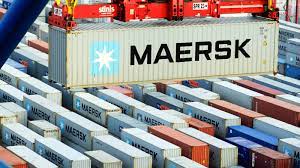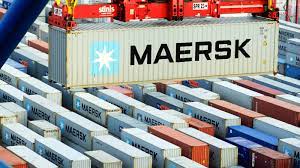
Even as shipping company A.P. Moller-Maersk announced record earnings for 2022, it also issued a caution on Wednesday that less violume of containers and lower freight rates would result in a four-fold decline in profits for the company in 2023.
The Copenhagen-based firm, which transports goods for retailers and consumer businesses like Walmart, Nike, and Unilever, doubled-up on its profit forecast last year as a surge in consumer demand and pandemic-related traffic jams at ports drove up freight rates.
However, as a recession approaches and import bubbles fueled by pandemics in the United States and other significant consumer countries deflate, freight rates have since fallen.
Maersk anticipates a 2.5% decrease in global demand for sea freight containers this year as a result of the winding down of an inventory buildup.
"The shipping market looks difficult right now. Freight rates have stabilized at a lower level that is not catastrophic for us," Chief Executive Vincent Clerc told journalists.
At a time when Maersk is acquiring warehouses and distribution centers to provide an end-to-end transportation service rather than just container shipping, Clerc, who assumed the role of CEO on January 1, said he would concentrate on keeping costs low.
One of the largest container shippers in the world, Maersk, reported that freight rates decreased by almost a quarter in the fourth quarter compared to the prior three months.
The business announced last month that it would end a vessel-sharing agreement with MSC, a company with headquarters in Switzerland, in 2025, potentially opening the door for more competition between the two largest container shipping firms in the world.
MSC has recently expanded its fleet in response to recent increases in freight rates.
"So far we have not seen any price war," Clerc said. "But we have some clear concerns around the second half of this year, when new ships will come to market," he said.
In contrast to last year's $36.8 billion, Maersk anticipates underlying earnings before interest, taxation, depreciation, and amortization (EBITDA) of $8-11 billion in 2023.
The forecast fell short of the $11.9 billion that analysts in a company survey had predicted.
Since peaking in January of last year, the company's shares have lost more than one-third of their value. They experienced a 5% decline in the opening minutes of trading on Wednesday, but by 1028 GMT, they had recovered 0.6%.
Compared to $7.99 billion a year earlier and the $6.95 billion forecasted by analysts in the company poll, underlying EBITDA for the quarter was $6.52 billion.
As a result of a 14% decrease in the quantity of containers it loaded onto ships, revenues fell to $17.8 billion.
(Source:www.cgtn.com)
The Copenhagen-based firm, which transports goods for retailers and consumer businesses like Walmart, Nike, and Unilever, doubled-up on its profit forecast last year as a surge in consumer demand and pandemic-related traffic jams at ports drove up freight rates.
However, as a recession approaches and import bubbles fueled by pandemics in the United States and other significant consumer countries deflate, freight rates have since fallen.
Maersk anticipates a 2.5% decrease in global demand for sea freight containers this year as a result of the winding down of an inventory buildup.
"The shipping market looks difficult right now. Freight rates have stabilized at a lower level that is not catastrophic for us," Chief Executive Vincent Clerc told journalists.
At a time when Maersk is acquiring warehouses and distribution centers to provide an end-to-end transportation service rather than just container shipping, Clerc, who assumed the role of CEO on January 1, said he would concentrate on keeping costs low.
One of the largest container shippers in the world, Maersk, reported that freight rates decreased by almost a quarter in the fourth quarter compared to the prior three months.
The business announced last month that it would end a vessel-sharing agreement with MSC, a company with headquarters in Switzerland, in 2025, potentially opening the door for more competition between the two largest container shipping firms in the world.
MSC has recently expanded its fleet in response to recent increases in freight rates.
"So far we have not seen any price war," Clerc said. "But we have some clear concerns around the second half of this year, when new ships will come to market," he said.
In contrast to last year's $36.8 billion, Maersk anticipates underlying earnings before interest, taxation, depreciation, and amortization (EBITDA) of $8-11 billion in 2023.
The forecast fell short of the $11.9 billion that analysts in a company survey had predicted.
Since peaking in January of last year, the company's shares have lost more than one-third of their value. They experienced a 5% decline in the opening minutes of trading on Wednesday, but by 1028 GMT, they had recovered 0.6%.
Compared to $7.99 billion a year earlier and the $6.95 billion forecasted by analysts in the company poll, underlying EBITDA for the quarter was $6.52 billion.
As a result of a 14% decrease in the quantity of containers it loaded onto ships, revenues fell to $17.8 billion.
(Source:www.cgtn.com)














